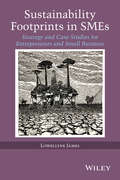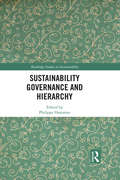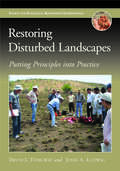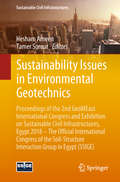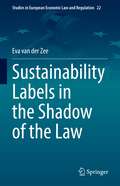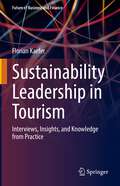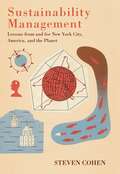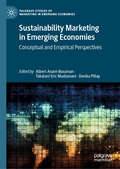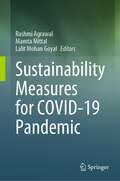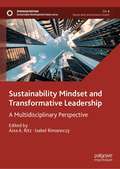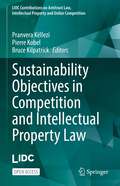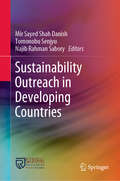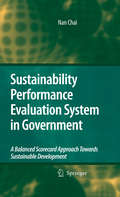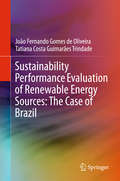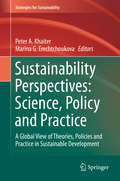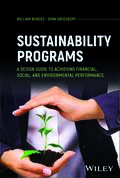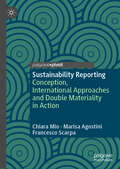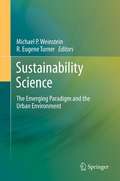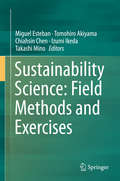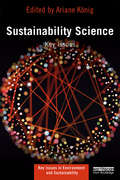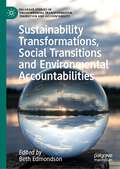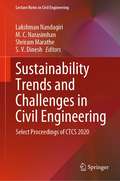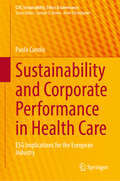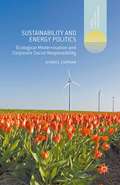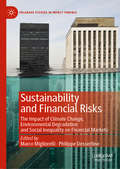- Table View
- List View
Sustainability Footprints in SMEs
by Lowellyne JamesReviews the evolution and theory of Sustainability Footprints e.g. carbon footprint and examines the critical success factors and contributions to small to medium sized enterprises (SME) growth* Assist firms in achieving sustainable growth in four key areas Innovation Impact, Cost Impact, Environmental Impact, and Stakeholder Impact* Identifies the challenges and Critical Success Factors (CSFs) in the use of sustainability footprint methodology within small businesses by the use of case studies* Proposes a strategic model suitable for the deployment of sustainability strategy and initiatives within business
Sustainability Governance and Hierarchy (Routledge Studies in Sustainability)
by Philippe HammanSustainability Governance and Hierarchy provides a solid, theoretically and empirically grounded reflection on the concept of "sustainability governance". This idea has been growing in popularity in social science literature, as well as among decision-makers and governance actors, as it brings together two vast fields of study that have sometimes been dismissed as vague or ideologically loaded. In order to link the concepts of "sustainability" and "governance", the book is organized around the exploration of hierarchy issues, which often lie in the background of the existing literature but are not the focus of analysis. The chapters reflect ongoing controversies and dialogue between scientists with different theoretical and thematic backgrounds, who are all willing to participate in and contribute to a constructive effort to reach a more inclusive and more theoretically relevant stage for sustainability studies, being content with merely global analyses. The book is an innovative contribution to the hierarchy/non-hierarchy debate regarding governance arrangements in the field of sustainability and sustainability studies. This book will be of interest to advanced students and scholars focusing on governance issues, sustainability studies, environmental studies, as well as on the methodological aspects of the social sciences (economy, geography, law, philosophy, political science, sociology, urbanism and planning).
Sustainability Indicators: A Scientific Assessment (SCOPE Series #67)
by Tomás Hák Arthur Lyon Dahl Bedrich MoldanWhile the concept of sustainability has been widely embraced, it has been only vaguely defined and is exceedingly difficult to measure. Sustainability indicators are critical to making the broad concept of sustainability operational by providing specific measures by which decision makers and the public can judge progress. Sustainability Indicators defines the present state of the art in indicator development. It presents a comprehensive assessment of the science behind various indicators, while placing special emphasis on their use as communications tools. The contributors draw on their experience as academics and practitioners to describe the conceptual challenges to measuring something as complex as sustainability at local, regional, national, and global scales. The book also reviews existing indicators to assess how they could be better employed, considering which indicators are overused and which have been underutilized. Sustainability Indicators will help planners and policy makers find indicators that are ready for application and relevant to their needs, and will help researchers identify the unresolved issues where progress is most urgently needed. All readers will find advice as to the most effective ways to use indicators to support decision making.
Sustainability Issues in Environmental Geotechnics: Proceedings of the 2nd GeoMEast International Congress and Exhibition on Sustainable Civil Infrastructures, Egypt 2018 – The Official International Congress of the Soil-Structure Interaction Group in Egypt (SSIGE) (Sustainable Civil Infrastructures)
by Hesham Ameen Tamer SorourThis edited volume deals with the attempts made by the scientists and practitioners to address contemporary issues in geoenvironmental engineering such as characterization of dredged sediments, geomaterials and waste, valorization of waste, sustainability in waste management and some other geoenvironmental issues that are becoming quite relevant in today's world especially in view of the high urbanization rates, advancement in technologies, and changes in consumption behavior of people. In this regard, wastes generated through the daily activities of individuals and organizations pose many challenges in their management. The volume is based on the best contributions to the 2nd GeoMEast International Congress and Exhibition on Sustainable Civil Infrastructures, Egypt 2018 – The official international congress of the Soil-Structure Interaction Group in Egypt (SSIGE).
Sustainability Labels in the Shadow of the Law (Studies in European Economic Law and Regulation #22)
by Eva van der ZeeThis book describes and examines three EU legal frameworks (EU competition law, EU consumer law, and EU fundamental rights law) that may affect the extent to which consumers purchase more sustainably. In doing so, this book goes beyond a rationalist understanding of the interpretation and application of EU law. Rational approaches have severely impacted the interpretation and application of EU law. Practice shows, however, that the implications of using a noncritical application of rationalist approaches in the interpretation and application of EU competition law, EU consumer law, and EU fundamental rights law to sustainability labels may have an inhibiting effect on sustainable consumption. The book offers remedies to overcome this inhibitive effect by critically applying insights from cognitive science and behavioral economics in the legal interpretation and application of EU law.
Sustainability Leadership in Tourism: Interviews, Insights, and Knowledge from Practice (Future of Business and Finance)
by Florian KaeferThis professional guidebook highlights sustainable tourism development and management for businesses and destinations. It presents a unique collection of expert interviews, combined with latest insights and thoughts on the most relevant topics and trends linked to sustainability in tourism, sustainable business management, and destination development. This is a book which offers inspiring personal stories and reflections, and at the same time serves as essential know-how guide for busy tourism entrepreneurs, managers, and developers who care about business resilience and the well-being of destination communities.
Sustainability Management: Lessons from and for New York City, America, and the Planet
by Steven CohenCan we grow our world economy and create opportunities for the poor while keeping the planet intact? Can we maintain our vibrant, dynamic lifestyles while ensuring the Earth stays productive and viable? Aimed at managers, students, scholars, and policymakers, Sustainability Management answers these questions in the affirmative, arguing it is possible for environmentally sustainable business practices and policies to foster economic and long-term growth. Written by a former analyst and consultant with the EPA, this book originally combines sustainable efforts in water, agriculture, urban, and power management to achieve-in practice, not just in theory-a sustainable planet and economy. Steven Cohen begins with the technical, financial, managerial, and political challenges of such a project, and then honestly assesses sustainable practices in the manufacturing and service industries. He addresses renewable and carbon-free energy production; water sustainability, especially with regard to energy issues involving filtration, distribution, and changing rainfall patterns; food cultivation and distribution; and ways to maintain the interdependent systems on which we depend to live. Taking examples from New York City, one of the most sustainable and sustainability-minded metropolises in the world, Cohen explains how everything from construction to waste management can be designed to facilitate a sustainable environment, not just for New York but also for the world. He concludes with this macroscopic view, outlining the global efforts necessary to preserve biodiversity and ecosystems, and the impact of war, terrorism, and human conflict on sustainability.
Sustainability Marketing in Emerging Economies: Conceptual and Empirical Perspectives (Palgrave Studies of Marketing in Emerging Economies)
by Albert Anani-Bossman Takalani E. Mudzanani Devika PillayThis book addresses the environmental, social, and economic challenges that corporations in emerging economies face, focusing on sustainability marketing as a paradigm-shifting approach. Drawing from cases across several emerging economies, including South Africa, Ghana, Nigeria, and Turkey, it examines how organisations can create long-term societal value through sustainable practices. Reflecting the increasing pressure for organisations to adopt sustainability practices, the need for this book is rooted in what organisations in emerging economies stand to gain from the adoption and implementation of sustainable marketing strategies. Chapters address consumer behaviour and demonstrate best practices for integrating sustainability into marketing strategies. The opportunities and challenges associated with implementing sustainability strategies post-COVID are also explored. This book, therefore, offers essential pathways and shares evidence of sustainability marketing. Covering topics such as the sustainability marketing mix, social marketing, sustainable consumption, and the role of communication, it is a valuable contribution to the ongoing discussion on sustainability from the perspective of emerging economies.
Sustainability Measures for COVID-19 Pandemic
by Mamta Mittal Lalit Mohan Goyal Rashmi AgrawalThis book focuses on sustainability issues post COVID-19 outbreak, discusses ways to restrict global spread of the pandemic, and also how to survive holistically in the environment. It also discusses the economic impacts on the world due to the coronavirus outbreak. There is a strong need for monitoring and analysis of pandemics for sustainability like epidemic risk analysis by using pattern recognition or the mental health challenges during an outbreak. This book presents ways to find solutions and gives insights to explore innovative methods and predictive modeling techniques, such that masses are prevented from pandemics.
Sustainability Mindset and Transformative Leadership: A Multidisciplinary Perspective (Sustainable Development Goals Series)
by Isabel Rimanoczy Aixa A. RitzThis volume examines the importance of leadership in developing an effective sustainability strategy. It defines the sustainability mindset and surveys the primary motivations, conditions, or environment(s) that cause leaders to embrace sustainable practices. As described in the UN Sustainable Development Goal 8, embracing the sustainability mindset will lead to greater productivity and promote economic growth.Organized into themes of organizational operations, leadership competencies, and leadership practices, the chapters, written by contributors representing global perspectives, tackle topics such as strategy, culture, and leadership styles in developing a new form of mindfulness for leaders as well as organizations. Recognizing the need for accelerated change in organizations as well as society at large, this book presents scholars with a framework for establishing a mindset for sustainability to foster much-needed transformative leadership.
Sustainability Objectives in Competition and Intellectual Property Law (LIDC Contributions on Antitrust Law, Intellectual Property and Unfair Competition)
by Bruce Kilpatrick Pierre Kobel Pranvera KëlleziThis open access volume of LIDC contributions focuses on how competition and intellectual property laws incorporate sustainability objectives. Businesses are increasingly embracing sustainability objectives, driven by the international community. Although competition and intellectual property law are certainly not the only tools for addressing sustainability issues, they can play a role in moving toward a more sustainable society.Sustainability has gained prominence in competition law in all jurisdictions covered in this volume. The contributions focus on classic questions such as whether sustainability agreements restrict competition and, if so, to what extent businesses can be exempted on efficiency grounds. The papers also raise a number of questions, in particular concerning the treatment of non-market efficiencies. The soft law and case law produced by competition authorities are examined, and the leadership role of some competition authorities in the field – from advocacy to policy papers and sustainability guidelines – is highlighted. The authors call for more individual guidance to provide enhanced transparency and clarity to industry, advisors and society at large on sustainability issues, with guidelines or sustainability-related block exemptions providing even greater legal certainty.With regard to intellectual property, the contributions examine various important issues, such as the need for intellectual property rights to remain technology-neutral, ways to promote the use of sustainable technologies and incentives for licensing, and ways to promote the dissemination of sustainable technologies, including compulsory licensing, cross-licensing, open source or FRAND licensing, and replacing the destruction of counterfeit goods with recycling. The papers also discuss greenwashing and how it can be addressed through revisions to trademarks and related rights.
Sustainability Outreach in Developing Countries
by Tomonobu Senjyu Mir Sayed Shah Danish Najib Rahman SaboryThis book presents a comprehensive collection of recent research on the timely topic of sustainable development goals, with a focus on developing countries. In this manner, it furnishes interdisciplinary coverage in terms of sustainable development; it sets forth the pillars of sustainability (environmental, technical and technological, social, institutional, and economic disciplines); and it explores the adaption of these pillars for long-term sustainability.With its survey of transboundary research, experiences, and lessons learned, the book offers integrated conceptual and empirical contributions from diverse interrelated fields. Viable options are set forth for societies in transition in the twenty-first century to achieve well-being in the lives of their people through the eradication of poverty, mitigation of climate change, promotion of lifelong learning opportunities, and empowerment of society. These options also make it possible to deploy affordable energy, sustain economic growth, offer innovation, reduce inequality, and finally, to help ensure global sustainability.
Sustainability Performance Evaluation System in Government: A Balanced Scorecard Approach Towards Sustainable Development
by Nan ChaiProgressing towards sustainable development raises important challenges to conducting performance evaluations in governments because there are neither generally accepted methods nor specific standards to be met at present. Sustainability Performance Evaluation System in Government, makes a conceptual contribution to public sustainability performance evaluation and develops a set of framework indicators with the help of the strategic and comprehensive approach "Sustainability Balanced Scorecard". As a conceptual basis for the further research and application, this volume will be of great interest to researchers and practitioners at many levels of environmental / sustainability, public management and strategic control studies. Evaluators will find methodological approaches and applied tools for their work. Decision-makers and managers will find it valuable to manage the social, economic and environmental issues in a balanced and integrated manner. Governments will also find it helpful in assisting them in establishing an evaluation system towards sustainable development.
Sustainability Performance Evaluation of Renewable Energy Sources: The Case of Brazil
by João Fernando Oliveira Tatiana Costa TrindadeThis book presents a unique analysis of the sustainability performance of various renewable energy sources, based on Brazilian case studies. The evaluation also covers the potential held by regions with diverse socioeconomic and environmental characteristics and how they affect the development of each source. Considering that energy is essential to sustaining and improving modern society, the answer to the current energy dilemma lies in the development of a system that comprises multiple renewable, reliable, and sustainable energy sources. Brazil, which has a predominantly renewable electricity grid, has the privilege of being home to a range of different sustainable sources, although most of its electricity comes from hydroelectric power plants. With that in mind, this book has the primary objective of developing a performance evaluation system for important renewable sources in Brazil (solar, wind, and hydro), taking into account different scenarios and investor profiles. The analysis is based on the study of sustainability indicators related to the technical, economic, social and environmental aspects of the evaluated energy systems. As the availability of renewable sources is very location-specific, the scope of this book covers two Brazilian States with distinct characteristics. It makes it possible to determine which renewable energy source is most adequate from a sustainability perspective, and in light of the analyzed scope and investor profile.
Sustainability Perspectives: A Global View of Theories, Policies and Practice in Sustainable Development (Strategies for Sustainability)
by Peter A. Khaiter Marina G. ErechtchoukovaThe book presents methodological and applied aspects of sustainability and sustainable management from different countries and regions around the globe. It discusses approaches to sustainability assessment, demonstrates how ideas of sustainability and sustainable management are incorporated into public policies and private actions at local and national levels. Authors focus on promoting greater sustainability in natural resource management, energy production and storage, housing design, industrial reorganization, coastal planning, land use, and business strategy, including sustainability indicators, environmental damages, and theoretical frameworks. Chapters reflect environmental, economic and social issues in sustainable development, challenges encountered, and lessons learned as well as solutions proposed.
Sustainability Programs: A Design Guide to Achieving Financial, Social, and Environmental Performance
by William Borges John GrosskopfGo-to guidance for designing, implementing, and managing effective sustainability programs and their management systems Moving past vague concepts, buzzword overloads, superficial efforts, and flavor-of-the-month misdirections, Sustainability Programs presents a pragmatic, step-by-step approach to creating and managing adaptable, organization-wide sustainability programs to achieve People, Planet, and Profit (3P) objectives with least cost, effort, and risk. Key steps covered in this book include reaching a programmatic “Go” decision, developing sustainability policies, designing an organizational framework, defining the most pressing sustainability needs, and cascading 3P goals, tactics, targets, and initiatives into business units, functions, and departments to create new capabilities and improve performance. By following the principles and practices in this book, any organization can better achieve sustainability’s full promise of social responsibility, environmental stewardship, and financial performance. Written by authors with a wealth of practitioner experience in the field, Sustainability Programs explores topics including: Creating social, environmental, and financial strategies, tactics, targets, and initiatives that create new capabilities and resolve 3P performance issuesAvoiding ad hoc projects that fail to address critical sustainability issues, wasting valuable resources and squandering competitive advantagesOvercoming technical professionals’ lack of business management experience and helping management professionals understand sustainability’s benefits and intricaciesUnderstanding sustainability through the management lenses of risk reduction, improved efficiencies through eradication of wastes, increased revenues via innovation, and enhanced competitive advantages fueled by greenwash-free transparency.Responding to the demanding data capture, analysis, and reporting challenges of environmental, social, and governance (ESG). Acknowledging that one size does not fit all, this book delivers individual concepts and methods adaptable across any organization’s value chains. It is an essential read for leaders and practitioners working within private and public enterprises of all types and sizes, especially those with 2,000 to 5,000 employees.
Sustainability Reporting: Conception, International Approaches and Double Materiality in Action (Palgrave Studies in Impact Finance)
by Chiara Mio Marisa Agostini Francesco ScarpaThe book provides a comprehensive exploration of the the evolution in sustainability reporting and non-financial disclosure from three perspectives: regulatory, literary, and empirical. First, the book discusses the variety of frameworks and standards, normative sources, and regulatory initiatives aimed at promoting and standardizing sustainability reporting at the international level. Second, the book offers a systematic review of academic literature on sustainability reporting and non-financial disclosure. Third, the book examines the concept of materiality in sustainability reporting and provides an empirical analysis of the quantity and quality of materiality disclosures in sustainability reporting across the globe. The book concludes by discussing future directions for developments in sustainability reporting research and practice, and is relevant to academics, practitioners, and students interested in the intersection of sustainability, corporate reporting, and corporate finance.
Sustainability Science
by R. Eugene Turner Michael P. WeinsteinThe object of this book is to highlight how the nascent field of sustainability science is addressing a key challenges for scientists; that is, understanding the workings of complex systems especially when humans are involved. A consistent thread in the sustainability science movement is the wide acknowledgement that greater degrees of integration across what are now segmented dimensions of extant Science and Technology systems will be a key factor in matching the most appropriate science and technology solutions to specific sustainability problems in specific places.
Sustainability Science: Field Methods and Exercises
by Miguel Esteban Takashi Mino Tomohiro Akiyama Chiahsin Chen Izumi IkedaThis book builds up on the experience and lessons learnt by academics at the Graduate Program in Sustainability Science, Global Leadership Initiative (GPSS-GLI) at the University of Tokyo. A number of scholars in the new field of sustainability science describe how field methods and exercises are carried out in this discipline, together with the theoretical basis for such exercises. Case studies of various countries around the world where these exercises are carried out are showcased, emphasizing the various socio-economic considerations and problems facing humanity and possible ways forward to build more sustainable and resilient societies. The final objective is to enrich the field of sustainability science by describing the novel aspects used in the field exercises carried out by practitioners of this cross-disciplinary field.
Sustainability Science: Key Issues (Key Issues in Environment and Sustainability)
by Jerome Ravetz Ariane König<p>Sustainability Science: Key Issues is a comprehensive textbook for undergraduates, postgraduates, and participants in executive trainings from any disciplinary background studying the theory and practice of sustainability science. Each chapter takes a critical and reflective stance on a key issue or method of sustainability science. Contributing authors offer perspectives from diverse disciplines, including physics, philosophy of science, agronomy, geography, and the learning sciences. <p>This book equips readers with a better understanding of how one might actively design, engage in, and guide collaborative processes for transforming human-environment-technology interactions, whilst embracing complexity, contingency, uncertainties, and contradictions emerging from diverse values and world views. Each reader of this book will thus have guidance on how to create and/or engage in similar initiatives or courses in their own context. <p>Sustainability Science: Key Issues is the ideal book for students and researchers engaged in problem and project based learning in sustainability science.</p>
Sustainability Transformations, Social Transitions and Environmental Accountabilities (Palgrave Studies in Environmental Transformation, Transition and Accountability)
by Beth EdmondsonThis book draws upon diverse approaches and understandings of sustainability transformations, social transitions and environmental accountabilities. It presents case studies that highlight real-world consequences of changing ideas about how best to achieve effective and durable sustainability transformations and examines how environmental accountabilities and social transitions influence sustainability transformations. Each chapter provides insights regarding how new knowledge and perspectives matter for whether, when, and how people, governments, corporations and international organisations seek and pursue solutions to social-ecological challenges and sustainability dilemmas. It pays sustained attention to whether and how understandings and applications of accountability can improve international sustainability transformations. The chapters presented in this book consider some pressing questions concerning social transitions and environmental accountabilities: how can they contribute to sustainability transformations, how do they influence the scalability of sustainability transformations, and, how can such sustainability transformations become durable?
Sustainability Trends and Challenges in Civil Engineering: Select Proceedings of CTCS 2020 (Lecture Notes in Civil Engineering #162)
by M. C. Narasimhan S. V. Dinesh Shriram Marathe Lakshman NandagiriThis book presents the select proceedings of the International Conference on Civil Engineering Trends and Challenges for Sustainability (CTCS 2020). The chapters discuss emerging and latest research and advances in sustainability in different areas of civil engineering, which aim to provide solutions to sustainable development. The contents are broadly divided into the following categories: construction technology and building materials, structural engineering, transportation and geotechnical engineering, environmental and water resources engineering, and RS-GIS applications. This book will be of potential interest to beginners, researchers, and professionals working in the area of sustainable civil engineering and related fields.
Sustainability and Corporate Performance in Health Care: ESG Implications for the European Industry (CSR, Sustainability, Ethics & Governance)
by Paolo CandioThis book explores the multifaceted relationship between sustainability and corporate performance in health care by providing a review of the relevant policy and academic literature, together with novel quantitative evidence to support strategic and managerial decision-making. The book uniquely investigates whether and how improvements in sustainability-related activities and reporting, and respective ESG scores assigned by international rating agencies, are related to corporations’ economic and market performance. The potential development and expansion in private health care services and products, accelerated by the COVID-19 pandemic, calls for a new paradigm in the health care industry. After introducing the reader to the social and policy context for sustainable development and to various normative and market instruments used to assess sustainability and corporate performance, the book presents the results of statistical analyses conducted on a representative sample of top health care companies listed in European capital markets and draws conclusions about the profitability and effectiveness of sustainability- and ESG-related investments. There’s a current debate about whether investing in sustainability not only fulfills ethical obligations but also drives long-term value. The empirical literature often presents conflicting findings, particularly when it comes to scholars’ relatively limited evaluation of the health care industry. The book sheds new light on this proposition and offers guidance on sustainable decision-making in health care, making it relevant for researchers and professionals.
Sustainability and Energy Politics: Ecological Modernisation and Corporate Social Responsibility (Energy, Climate and the Environment)
by Giorel CurranThe author explores the fraught politics of energy transitions in an age of climate change. She does so through an ecological modernisation and corporate social responsibility lens which she contends shapes and underpins sustainability today. Case studies cover climate policy, unconventional gas and renewable energy.
Sustainability and Financial Risks: The Impact of Climate Change, Environmental Degradation and Social Inequality on Financial Markets (Palgrave Studies in Impact Finance)
by Marco Migliorelli Philippe DessertineDespite growing discussions on the relationship between sustainability and finance, so far little attention has been given to the relation linking sustainability-related risks and financial risks. Climate change, environmental degradation and social inequality, among others factors, may indeed have considerable adverse impacts on financial actors and markets, and even have the potential to harm financial stability. Shedding light on the importance of the nexus between sustainability and financial risks, this book addresses the need for new industry and policy approaches. With insights from a skilled set of scholars in the finance field, this edited collection explores the effects of climate risks on the banking and insurance industries, the problem of stranded assets, the possible corporate risk management frameworks that could be used to control sustainability-related risks, the role of non-financial disclosure in fostering market discipline, and the policy actions needed to integrate sustainability considerations into prudential supervision. Tackling an interdisciplinary topic, this book will appeal to academics and practitioners within the finance, business and sustainability fields.
